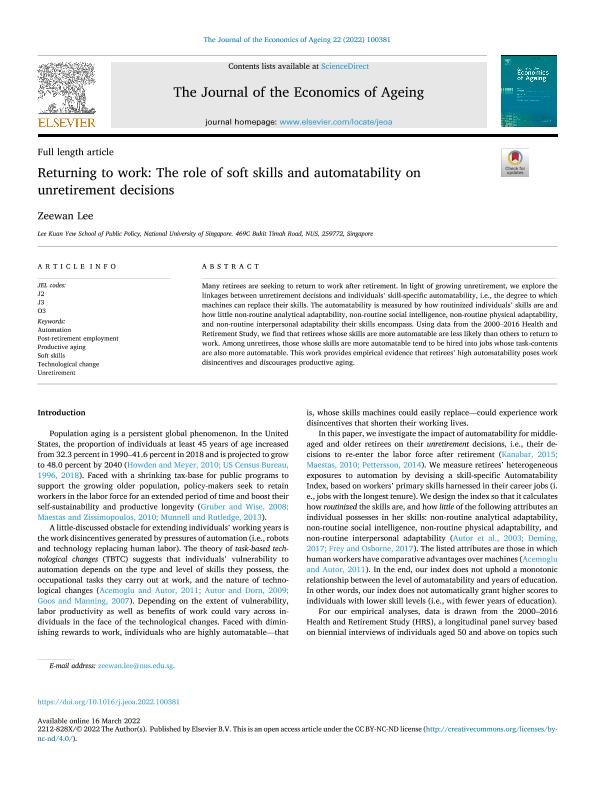Returning to work : The role of soft skills and automatability on unretirement decisions

Contenido multimedia no disponible por derechos de autor o por acceso restringido. Contacte con la institución para más información.
| Tag | 1 | 2 | Value |
|---|---|---|---|
| LDR | 00000cab a2200000 4500 | ||
| 001 | MAP20220017497 | ||
| 003 | MAP | ||
| 005 | 20220613120507.0 | ||
| 008 | 220613e20220606esp|||p |0|||b|spa d | ||
| 040 | $aMAP$bspa$dMAP | ||
| 084 | $a931.2 | ||
| 100 | 1 | $0MAPA20220006040$aLee, Zeewan | |
| 245 | 1 | 0 | $aReturning to work$b: The role of soft skills and automatability on unretirement decisions$cZeewan Lee |
| 520 | $aMany retirees are seeking to return to work after retirement. In light of growing unretirement, we explore the linkages between unretirement decisions and individuals' skill-specific automatability, i.e., the degree to which machines can replace their skills. The automatability is measured by how routinized individuals' skills are and how little non-routine analytical adaptability, non-routine social intelligence, non-routine physical adaptability, and non-routine interpersonal adaptability their skills encompass. Using data from the 20002016 Health and Retirement Study, we find that retirees whose skills are more automatable are less likely than others to return to work. Among unretirees, those whose skills are more automatable tend to be hired into jobs whose task-contents are also more automatable. This work provides empirical evidence that retirees' high automatability poses work disincentives and discourages productive aging. | ||
| 650 | 4 | $0MAPA20080554927$aJubilación | |
| 650 | 4 | $0MAPA20080568771$aEnvejecimiento | |
| 773 | 0 | $wMAP20210010194$g06/06/2022 Volumen 22 - 2022 , 13 p.$tThe Journal of the economics of ageing $dOxford : Elsevier ScienceDirect, 2021- |

